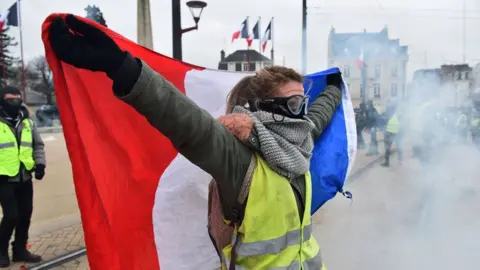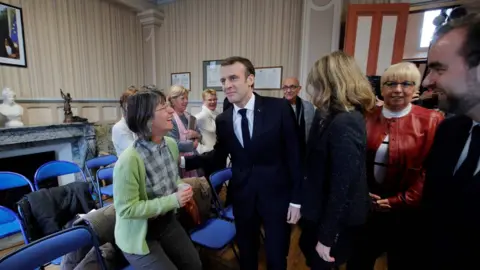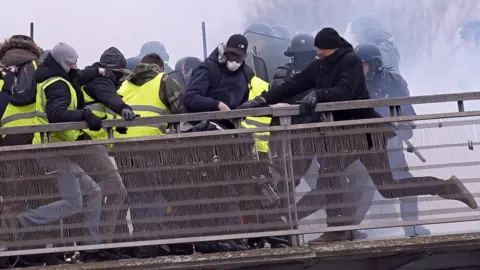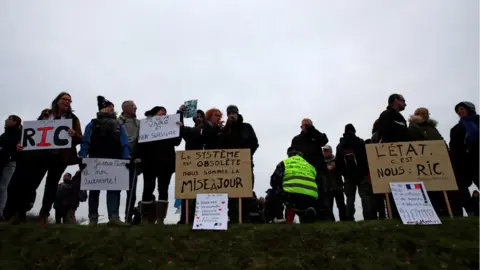Gilets jaunes: Will Macron's Grand Debate tackle French crisis?
 AFP
AFPAn imaginative bid to revitalise democracy in the social media age. Or a cynical manoeuvre to outfox the yellow-vest protesters, and buy time before the Euro-elections in May.
Those are the two prevailing interpretations of President Emmanuel Macron's Grand Debate, which he launched in northern France on Tuesday.
Over the next two months the plan is for French people everywhere to join in a kind of mass consultation, the conclusions of which will be fed up to government and - in theory - help shape the second half of the Macron mandate.
It is part two of Mr Macron's response to the yellow vests. Their at times violent protests since mid-November - originally over fuel tax and the cost of living, later against the "system" as a whole - have created his biggest crisis so far.
In December he announced €10bn (£8.9bn; $11.4bn) in pay rises and tax cuts for the less well-off.
What is the aim of the debate?
This new initiative is meant to allay another grievance: the lack of democratic representation felt by many people in rural and small-town France.
The president's reasoning was set out in a Letter to the French, which he published at the weekend.
France - and Europe - are in a state of anxiety and commotion, he argues.
Clear ideas need to be found "in order to transform the anger into solutions". He wants a new "contract for the nation" - and is asking "the people" to help define its contours.
How will it work?
The debates can be held anywhere, and draw in anything from a handful of participants to a crowd. "There must be no taboo," he said on Tuesday.
The debates can also take place online. A central group of staff in Paris will provide information packs and guidelines for moderators.
After a month, contributors will be chosen by lot from each region and they will then collate the recommendations and pass them up to the government.
 AFP
AFPPresident Macron undertakes to "account for them directly in the month following the end of the debate".
There are four themes:
- Tax and public spending
- Organisation of the state and public services
- Ecological transition
- Democracy and citizenship
In his letter, the president gives examples of the kind of question he thinks should be answered.
How can we make taxation fairer and more effective? What taxes should be reduced as a priority? Are there public services that could be abolished because they are not cost-effective?
On the issue of democratic representation - a hot topic for yellow-vests - he asks whether blank votes should be counted in elections, and if there should be greater use of referendums.
 EPA
EPAUnexpectedly he also raises immigration.
Do you think there should be annual quotas set by parliament? What do you propose in order to respond to the ongoing challenge?
What do gilets jaunes think?
Reaction to the Grand Debate among yellow vests has been lukewarm to say the least. "Smokescreen" is the general epithet.
One of the movement's leaders - Maxime Nicolle, aka Fly Rider - deplored that there was no mention in President Macron's letter of any of their demands, such as reinstatement of a wealth tax or so-called Citizens' Initiative Referendums.
"All he's doing is giving us a lesson in how to behave, as if we're children and he's the daddy," he said.
But at a rally of yellow vests in Bourges on Saturday, many protesters felt obliged to concede that the idea of the debate was in itself not a bad one.
 Reuters
ReutersGreater consultation with the people is, after all, at the heart of their cause.
And among the Paris commentariat there is a visible desire not to dismiss the Grand Debate out of hand.
As Le Monde's Gerard Courtois puts it: "To bet on failure would be irresponsible. To bet on success would be naïve. The most important thing is to take part."
Across the country polls suggest between 40% and 50% of French people would like to take part - which is certainly not a complete rejection. But good feeling for the yellow vests also remains strong - at around 67%
So is this a cunning ploy to defeat the protesters or a genuine bid to reconnect with the country?
Perhaps, in true Macronian fashion, it is both.
